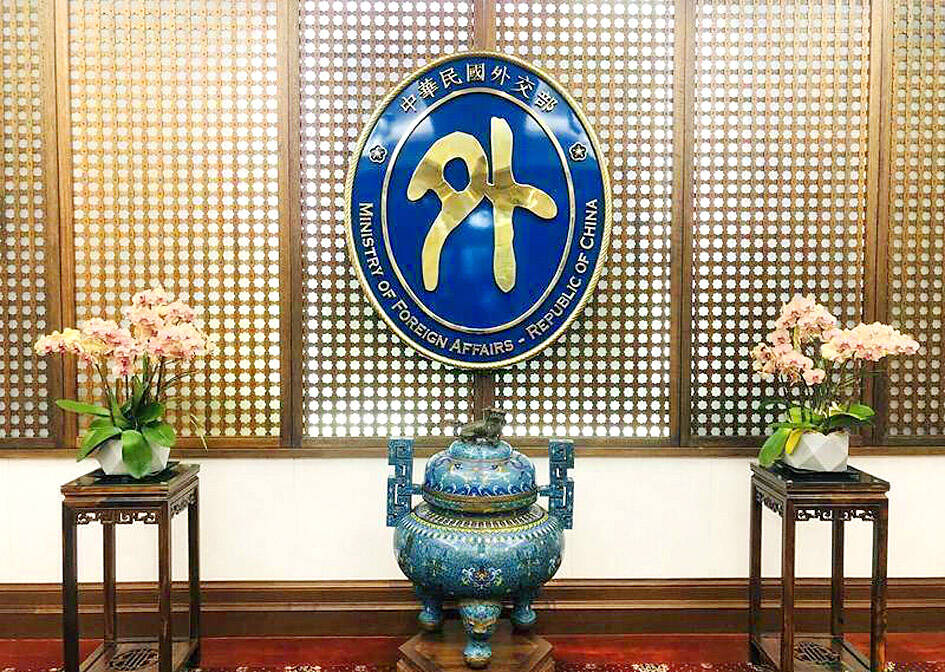Taiwan has launched a two-year program with the Central American Integration System (SICA) to promote sustainable development, tourism and energy transition projects in Guatemala and Belize.
Ambassador to Guatemala Miguel Tsao (曹立傑), Guatemalan Minister of Foreign Affairs Carlos Ramiro Martinez, Belizean Ministry of Foreign Affairs, Foreign Trade and Immigration Chief Executive Officer Amalia Mai and SICA Executive Director Ingrid Figueroa attended the launch ceremony for the new cycle of seven regional cooperation projects on Wednesday, Taiwan’s embassy in Guatemala said.
The projects include cooperation in public health, climate change, marine environmental protection, small and medium-sized enterprise development, sustainable tourism, energy transition and electric vehicles, digital transformation and institutional capacity-building.

Photo: Yang Cheng-yu, Taipei Times
One of the focuses of the new projects is to support micro, small and medium-sized enterprises by promoting sustainable practices that would bolster productivity and help conserve the natural and cultural environment, the Central America Tourism Agency said.
The governments of Guatemala and Belize thanked Taiwan for its long-term cooperation with SICA to assist its allies in economic and social development, environmental protection and climate change, the embassy said.
The efforts have helped the Central American countries’ regional and national development and improved their people’s well-being, it said.
They also expressed deep concern after Wednesday’s massive earthquake, which measured 7.2 on the Richter scale, and wished for a quick recovery for Taiwanese, it added.
As a beacon of freedom and democracy, Taiwan plays an important role in the international community and would continue to work hand in hand with SICA and Central American countries to promote prosperity and development in the region, Tsao said.
He also thanked the two countries for supporting peace and stability across the Taiwan Strait.
Taiwan began working with SICA in 1992 and became an official observer in 2002, helping launch more than 120 projects in fields such as renewable energy, democracy, tourism, maritime transportation, public health and climate change.
SICA comprises the Central American Parliament, the Central American Bank for Economic Integration and the Central American Common Market.
Taiwan in August last year withdrew from the parliament after the body voted to expel the nation in favor of China, which prompted worries that Taiwan’s observer status in SICA and its non-regional membership in the Central American Bank for Economic Integration might be challenged.
The Ministry of Foreign Affairs previously said that for major proposals to be adopted in SICA, they must be deliberated and a consensus must be reached at the Foreign Ministers Meeting and Summit of Heads of State.
As two of Taiwan’s diplomatic allies — Belize and Guatemala — are members of SICA, the nation’s participation and rights in the body would not be affected, it said.
Additional reporting by CNA

The manufacture of the remaining 28 M1A2T Abrams tanks Taiwan purchased from the US has recently been completed, and they are expected to be delivered within the next one to two months, a source said yesterday. The Ministry of National Defense is arranging cargo ships to transport the tanks to Taiwan as soon as possible, said the source, who is familiar with the matter. The estimated arrival time ranges from late this month to early next month, the source said. The 28 Abrams tanks make up the third and final batch of a total of 108 tanks, valued at about NT$40.5 billion

A group from the Taiwanese Designers in Australia association yesterday represented Taiwan at the Midsumma Pride March in Melbourne. The march, held in the St. Kilda suburb, is the city’s largest LGBTQIA+ parade and the flagship event of the annual Midsumma Festival. It attracted more than 45,000 spectators who supported the 400 groups and 10,000 marchers that participated this year, the association said. Taiwanese Designers said they organized a team to march for Taiwan this year, joining politicians, government agencies, professionals and community organizations in showing support for LGBTQIA+ people and diverse communities. As the first country in Asia to legalize same-sex

Travel agencies in Taiwan are working to secure alternative flights for travelers bound for New Zealand for the Lunar New Year holiday, as Air New Zealand workers are set to strike next week. The airline said that it has confirmed that the planned industrial action by its international wide-body cabin crew would go ahead on Thursday and Friday next week. While the Auckland-based carrier pledged to take reasonable measures to mitigate the impact of the workers’ strike, an Air New Zealand flight arriving at Taipei from Auckland on Thursday and another flight departing from Taipei for Auckland on Saturday would have to

MOTIVES QUESTIONED The PLA considers Xi’s policies toward Taiwan to be driven by personal considerations rather than military assessment, the Epoch Times reports Chinese President Xi Jinping’s (習近平) latest purge of the Chinese People’s Liberation Army (PLA) leadership might have been prompted by the military’s opposition to plans of invading Taiwan, the Epoch Times said. The Chinese military opposes waging war against Taiwan by a large consensus, putting it at odds with Xi’s vision, the Falun Gong-affiliated daily said in a report on Thursday, citing anonymous sources with insight into the PLA’s inner workings. The opposition is not the opinion of a few generals, but a widely shared view among the PLA cadre, the Epoch Times cited them as saying. “Chinese forces know full well that